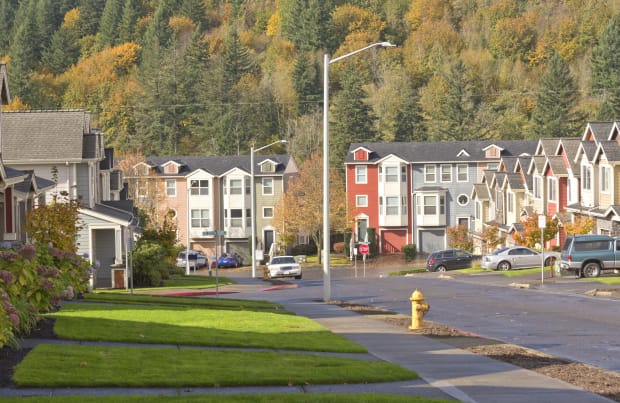Real estate experts eyeing a new bear market and record high inflation are finding themselves changing their advice on how and when to buy a home.
Facing record inflation at 8.6%, American regulators have also ratcheted up interest rates, causing many previous would-be buyers to stay on the sidelines of an already overheated real estate market.
Some mortgage experts told TheStreet that even with prices occasionally softening, the market for housing still remains a tricky place to buy or sell a home.
Tabitha Mazzara, director of operations, MBANC, said some sellers are waiting to put houses on the market because they're worried they would then find themselves between abodes.
"I wouldn't sell. If you sell, where are you going to live?" Mazzara said.
"With inventory low and demand high, it's a competitive market," she said.
"You might make money selling your old house, but you still have to buy a new one, and it might be smaller or in a less desirable location," Mazzara said.

You Might Not Find a Home Yourself
Sellers who do decide to put their homes up for sale may not see much of a profit either.
Jacob Channel, senior economic analyst at LendingTree, said that because the market is still cooling down, sellers might see little in the way of huge profits.
"Don’t rush into selling your house just because you think you’ll be able to get a price significantly higher than what you paid," Channel said.
"Remember that if the price of your home has skyrocketed, then odds are the prices of other homes in your area have done the same," he said.
"This means that if you sell before finding a new place to buy, you could end up priced out of the market that you’re currently in."
The signs that buyers are finally slowing down can be found in a variety of places, but applications for new mortgages is one particularly helpful metric.
Data from the the Mortgage Bankers Association from June 10 saw applications for purchase mortgages falling 15% from the same period last year.
Channel said that's because inflation, record high home prices and newly steep mortgage rates are slowly winnowing out interested buyers.
But even with those factors, real estate remains in a white-hot zone for now.
"It’s important to note that while 15% is a noteworthy drop, we are coming off a period where the housing market was unusually hot, so this drop may be indicative of a return to normalcy, as opposed to a major slump," he said.
So Should You Wait to Get a Mortgage?
Whether or not to take out a mortgage is usually a highly personal situation, depending on how soon you need a new home and whether or not you can afford the market.
Channel said that typically the year's warmer months are prime homebuying season, and thus far that's lead to a slight bump on week-to-week application data.
"But the average interest rate on a 30-year, fixed-rate mortgage just jumped by 55 basis points this week according to Freddie Mac data," Channel said.
"So some of the typical increases in homebuyer demand that the summer brings will likely be offset if rates continue to climb," he said.
Channel said he expects to see fewer and fewer mortgage applications as the year goes on and buyers get priced out of the market via higher interest rates.
"As a result, mortgage applications could fall even further compared to last year as rates continue to rise," he said.
Mazzara said that ultimately, everyone is different when it comes to buying a home. For most people, you are just ready when you are ready.
"Not everybody is ready at this moment. But because of limited inventory, there will be greater demand in certain states like California or Florida," she said.
That kind of demand and supply problem will only get worse the more buyers that are looking.
"Interest rates are going to continue to go up, and investors are continuing to enter the housing market in greater numbers, which will only drive prices up in the long term," Mazzara said.
Buyer Beware
If you are thinking of taking out a mortgage, make sure to do your homework.
Buyers should be wary of a few red flags that are appearing in what is likely the tail-end of an unprecedented real estate boom.
"It's a buyer beware situation out there with a lot of mortgage brokers — not lenders, but brokers," Mazzara said.
"You have a lot of mortgage brokers who've been squeezed by the collapse of the refi business, they'll advertise a rock-bottom interest rate designed to entice borrowers," she said.
Mazzara cautioned that these types of ads can spell trouble.
That's because when a borrower fills out a loan application with these middlemen, they eventually learn the advertised rate is actually out of reach for all but an "extremely narrow" segment of the population.
"The fine print might reveal, for example, that the deal is only good for people with a credit score of 780 or above who can afford to make a 45% down payment," she said.
Mazzara said these are "bait-and-switch" tactics designed to mislead consumers who are concerned about rising interest rates. That can include brokers advertising rates that are no longer available.
"Some borrowers might eventually walk away after they get wise to these misleading tactics, but the delay in funding might mean losing their dream house," she said. "[That's] an extremely frustrating situation in such a competitive market."







